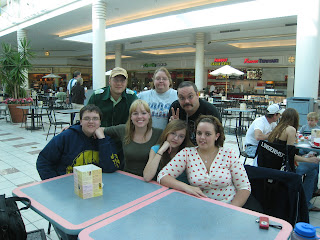Here is an article about what's been going on in Ulaanbaatar this week.

ULAN BATOR, Mongolia (AFP) - Mongolian President Nambariin Enkhbayar declared Tuesday a four-day state of emergency as protestors went on the rampage in the capital claiming that weekend elections were rigged.
"From 11:30 pm (1530 GMT) on Tuesday there will be a four-day state of emergency," said a presidential decree read out on state television.
The decree warned that anyone caught on the streets after the 10:00 pm curfew without documentation would be arrested. Public gatherings and independent media broadcasts were also banned.
The action came after thousands of people took to the streets of the Mongolian capital Ulan Bator on Tuesday to voice their outrage at weekend elections they claim were rigged.
The headquarters of the former communist Mongolian People's Revolutionary Party (MPRP) in the centre of Ulan Bator was set alight and looted, according to an AFP reporter and other witnesses at the scene.
Some of an estimated 6,000 protesters from the rival Democratic Party -- which claims the MPRP bought votes and used other tactics to win Sunday's election -- threw rocks at firefighters arriving to put out the blaze.
Police responded by firing rubber bullets and tear gas but the clashes continued and the violence later spread to other parts of the capital.
A police station was attacked when protesters attempted to free rioters imprisoned earlier in the day.
Part of the Cultural Palace, which contains an art gallery, a museum and a theatre, was on fire early Wednesday as violence continued despite the emergency decree.
TV images showed riot police around the Cultural Palace apparently arresting people and firing rubber bullets in an attempt to secure the area. Later images appeared to show the situation was calmer.
Early reports said 30 policemen and 25 civilians had been injured.
A European photographer said he was been beaten by police when he attempted to take photographs of police violence.
Politics in Mongolia, a country of 2.6 million people sandwiched between China and Russia, has a recent history of turmoil and disputes, but such violence is rare.
The technically neutral President Enkhbayar -- previously with the MPRP -- summoned Prime Minister Sanjagiin Bayar and all opposition party leaders to an emergency security meeting earlier on Tuesday.
At the meeting, broadcast live on the privately run Eagle television, the MPRP-affiliated Bayar renewed his calls for restraint while blaming the Democrats for inciting the rioters after losing the elections.
Democrat leader Tsakhia Elbegdorj countered that MPRP corruption had prompted the riots and torching of the party's headquarters.
Before the unrest erupted, Elbegdorj said bluntly that "illegal activities" had robbed the Democrats of victory.
"This was a dark moment in the history of Mongolia," he added.
The MPRP, which ruled for decades under the protection of the former Soviet Union, says it won 45 seats in the 76-seat Great Hural while the Democrats have reportedly won 21 seats.
The General Election Committee has yet to make a formal announcement on the ballot.
"This election was run by one party. It is a false election," one of the protesters, Galsan-Namjillin Sukhbaatar, told AFP outside the MPRP headquarters.
Another protester, Enkhamgalan Dorjsuren, 34, said: "The people have come here to fight for their freedom."
The MPRP ruled Mongolia from its independence from the Chinese in 1921 until 1996, when it was beaten in elections by the Democratic Party.
In 2004, Mongolia's last general election, the MPRP and the Democrats were forced into a coalition that produced three different prime ministers.
The instability held up economic reforms and shook investor confidence, but the nation's economy still grew by 9.9 percent last year thanks largely to its vast deposits of copper and gold.











